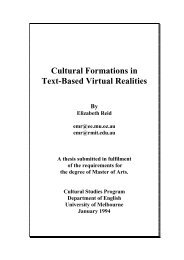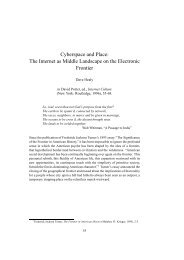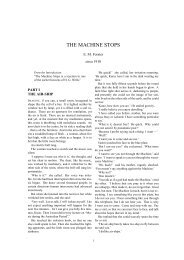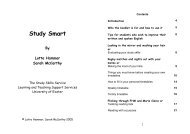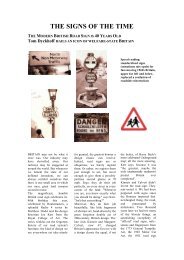PDF - The Metaphysics of Virtual Reality - University of Exeter
PDF - The Metaphysics of Virtual Reality - University of Exeter
PDF - The Metaphysics of Virtual Reality - University of Exeter
Create successful ePaper yourself
Turn your PDF publications into a flip-book with our unique Google optimized e-Paper software.
in typifying and standardizing things also implies a trade<strong>of</strong>f. When we first reach forward<br />
and grasp things, we see only the benefits <strong>of</strong> our standardization, only the positive<br />
side <strong>of</strong> greater clarity and utility. It is difficult to accept the paradox that no matter how<br />
alluring, every gain in fixed intelligibility brings with it a corresponding loss <strong>of</strong> vivacity.<br />
Because we are finite, every gain we make also implies a lost possibility. <strong>The</strong><br />
loss is especially devastating to those living in the technological world, for here they<br />
enjoy everything conveniently at their disposal—everything, that is, except the playful<br />
process <strong>of</strong> discovery itself.<br />
<strong>The</strong> McLuhan-inspired theory <strong>of</strong> cultural transformation brings out even more<br />
sharply the impact <strong>of</strong> the word processor. But this theory lacks a poignant sense <strong>of</strong><br />
loss or a feel for the trade-<strong>of</strong>fs in finite historical transformations. Ong’s version <strong>of</strong><br />
cultural transformation has about it something <strong>of</strong> a grand Christian optimism, seeing<br />
in the global network <strong>of</strong> electronic radio, television, and film a way <strong>of</strong> reintegrating<br />
a fallen, fragmented humanity, creating a closer community. For Ong, the shift from<br />
a predominantly oral culture to a literate culture shattered the original tribal unity. In<br />
bringing about greater individualism and fostering the logical faculties, literacy cut<br />
into the psychic roots <strong>of</strong> belonging and severed the attachment to immediate interpersonal<br />
presence. <strong>The</strong> print culture even further reinforced literacy, spreading it ever<br />
more widely, lifting individualism to unprecedented heights. <strong>The</strong>n, in Hegelian fashion,<br />
Ong sees the electronic media sublating the earlier oppositions, the oral and the<br />
literate, so that electronics achieves an encompassing synthesis. Electronic visuals,<br />
supported by voices, re-creates human presence and reunites the individuated members<br />
<strong>of</strong> the community. Underneath, however, the electronic images still depend on<br />
the reading <strong>of</strong> scripts, prepared messages, and a printinformed society. So the electronic<br />
media preserve individual literacy while surpassing it. Because <strong>of</strong> his hopeful<br />
Hegelian dialectic, Ong omits the critical evaluation that can take place only in the existential<br />
moment. Whereas McLuhan remained publicly silent on the adverse effects<br />
<strong>of</strong> the new media, Ong appears to have absorbed criticism in a larger pic-<br />
69



